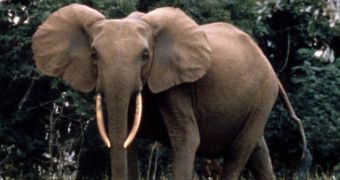Troubling news from Africa says that, in just ten years, roughly 62% of the elephants inhabiting the forests in this part of the world were killed by poachers who later collected their tusks and sold them on the illegal ivory market.
After carrying out a survey on the forest elephants now left to populate Cameroon, Central African Republic, the Democratic Republic of Congo, Gabon and the Republic of Congo, a team of wildlife researchers came to understand that, given the current killing rates, this species is likely to soon fall off the biodiversity map.
Although some might argue that Africa's forest elephants population also declined because of this species' losing their natural habitats in favor of humans, conservationist Samantha Strindberg maintains that these animals are now absent even in areas where the forest coverage has remained roughly the same.
According to Mongabay, Samantha Strindberg's exact words on the matter at hand were as follows:
“Historically, elephants ranged right across the forests of this vast region of over 2 million square kilometers (over 772,000 square miles), but now cower in just a quarter of that area.”
“Although the forest cover remains, it is empty of elephants, demonstrating that this is not a habitat degradation issue. This is almost entirely due to poaching,” Samantha Strindberg further argued.
Should things continue to unfold in this manner, it is the wildlife researchers' belief that Africa's forest elephants will become extinct at one point in the following 10 years.
As conservationists explain, this species can only be saved if efforts are made to curb both poaching activities and trading operations having to do with buying and selling their tusks.
“Saving the species requires a coordinated global effort in the countries where elephants occur – all along the ivory smuggling routes, and at the final destination in the Far East. We don’t have much time before elephants are gone,” explained Fiona Maisels, now working with the Wildlife Conservation Society.

 14 DAY TRIAL //
14 DAY TRIAL //